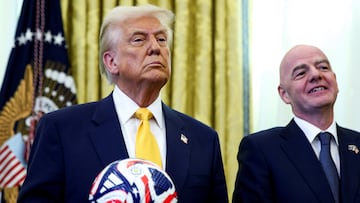Trump sparks World Cup storm
The first operational meeting between the U.S. and FIFA surfaced three thorny issues: fan deportations, Russia’s ongoing ban, and the possible exclusion of Iranian nationals.

The United States is months away from hosting two of the biggest sporting events in history. First comes the much-hyped “Super Club World Cup” this June, followed next year by the largest FIFA World Cup ever held—jointly staged with Mexico and Canada.
Just days before preparations began for the Club World Cup, organizers held the first meeting of the official task force overseeing both tournaments. That initial session quickly exposed three sensitive flashpoints that illustrate the high stakes and political complexity surrounding events of this scale.
Infantino corrects Trump on Russia
At the task force’s first public appearance, President Donald Trump said he believed allowing Russia to participate in the World Cup could help bring an end to the war in Ukraine. FIFA President Gianni Infantino stepped in to correct him, clarifying that Russia remains under suspension due to the military conflict it launched in 2022.

“I didn’t know that. Is that true?” Trump asked on camera. After Infantino confirmed the sanction, Trump suggested that lifting the ban—if the war ends—could serve as an incentive for Vladimir Putin to withdraw troops and cease hostilities.
Mass deportation warning for fans: “When time’s up…”
Vice President J.D. Vance also raised a politically charged issue that could seriously undermine the U.S. as a host nation: the treatment of fans whose visas expire.
“They’ll be welcome. We want people to come and watch matches, but when time’s up, they’ll need to go home. Otherwise, they’ll be dealing with Secretary Noem,” said Vance, referring to Kristi Noem, the U.S. Secretary of Homeland Security.

The U.S. visa process is notoriously strict, and any misstep—overstaying, incorrect filings, or technical violations—can lead to deportation. That could significantly reduce the number of international fans traveling to the tournament, a blow to both the event’s image and its economic impact. The issue has gained more attention following the Qatar World Cup, which faced sharp scrutiny on similar grounds.
Iran tensions raise the possibility of a U.S. entry ban
Iran qualified for the 2026 World Cup on March 25. But rising diplomatic tensions with the United States have cast doubt over its participation. According to U.S. media reports, Trump is reportedly considering a travel ban affecting citizens from 43 countries—including Iran.
Just over a year ago, Indonesia barred Israel from participating in the U-20 World Cup it was set to host. FIFA responded by moving the tournament to Argentina. Such a move would be far more difficult in 2026. A more likely, albeit unconfirmed, alternative would be for Iran to play all its matches in Mexico or Canada, neither of which has voiced support for a ban.

While the issue isn’t yet urgent—since no Iranian clubs are participating in this year’s Club World Cup—it could come to a head with Mehdi Taremi. The Iranian striker, who is set to compete in the tournament with Inter Milan, could offer a preview of how U.S. authorities plan to handle the arrival of Iranian nationals. What happens in his case may foreshadow Iran’s World Cup status in 2026.
Get your game on! Whether you’re into NFL touchdowns, NBA buzzer-beaters, world-class soccer goals, or MLB home runs, our app has it all.
Dive into live coverage, expert insights, breaking news, exclusive videos, and more – plus, stay updated on the latest in current affairs and entertainment. Download now for all-access coverage, right at your fingertips – anytime, anywhere.
Complete your personal details to comment
Your opinion will be published with first and last names